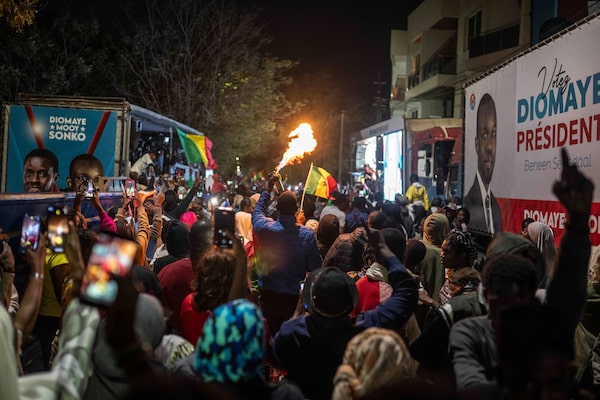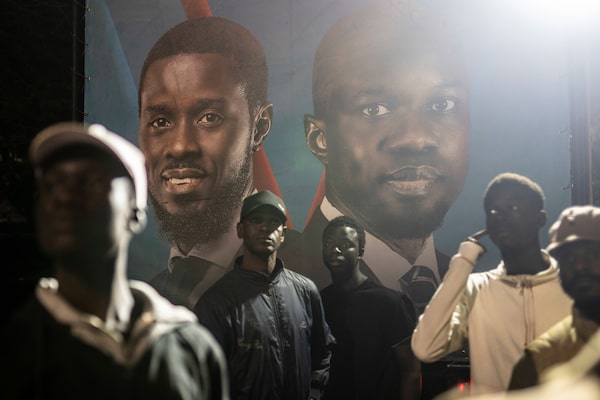
Supporters of presidential candidate Bassirou Diomaye Faye and Senegal's top opposition leader, Ousmane Sonko, gather outside their campaign headquarters as they await the results of the presidential election, in Dakar, Senegal, on March 24.Mosa'ab Elshamy/The Associated Press
Opposition candidate Bassirou Diomaye Faye has won Senegal’s presidential election, capturing a landslide victory just 10 days after being freed from prison on unproven charges of inciting insurrection.
Mr. Faye, who turned 44 on Monday, will become the youngest president in Senegal’s history and the youngest elected president in Africa today. His rivals conceded defeat less than a day after the polls closed in Sunday’s election.
The former tax collector was an obscure figure in Senegal until he was endorsed by a charismatic opposition leader, Ousmane Sonko, who was barred from the election because of a controversial conviction on a defamation charge.
Official results have not yet been released, but provisional results from the electoral commission on Monday night showed that Mr. Faye was leading with about 54 per cent, while the ruling party candidate, Amadou Ba, was second with 36 per cent. About 90 per cent of the votes were counted in the provisional numbers.
Senegal’s peaceful election and transition of power is seen as a major victory for African democracy after widespread international concern about a series of military coups and manipulated elections in other countries in recent years.

Supporters of presidential candidate Bassirou Diomaye Faye and Senegal's top opposition leader, Ousmane Sonko in Dakar, Senegal.Mosa'ab Elshamy/The Associated Press
Democracy has been under siege in Senegal, too, as opposition candidates were jailed or disqualified from the election and authorities tried to postpone the vote to the end of this year. More than 1,200 people have been jailed since 2021 for anti-government protests, human rights groups say.
Mr. Ba, a former prime minister, phoned Mr. Faye on Monday to concede defeat. Just a day earlier, Mr. Ba had declared he was confident of full victory.
By conceding defeat, Mr. Ba was acknowledging that Mr. Faye had gained more than 50 per cent of the vote – the minimum necessary for avoiding a second-round runoff between the top two candidates.
Thousands of Mr. Faye’s supporters celebrated in the streets of Senegal’s cities on Sunday night, within hours of the polls closing, as the early results showed Mr. Faye with a strong lead over Mr. Ba and 17 other candidates.
Authorities had detained Mr. Faye for nearly a year on accusations of defamation and inciting insurrection after he wrote a social media post that criticized Senegal’s justice system for its prosecution of opposition leaders.
His supporters said the criminal charges were politically motivated. He was released from prison on March 14, and thousands of supporters immediately flocked to his campaign rallies.
Supporters of Senegalese presidential candidate Bassirou Diomaye Faye celebrate early results, in Dakar, Senegal.Zohra Bensemra/Reuters
In a statement on Monday, posted on social media, Mr. Ba said he congratulated Mr. Faye on his first-round victory, and wished him the “energy and strength” necessary for the top job.
President Macky Sall, who will step down on April 2 at the end of his second term in office, praised the smooth running of the election and congratulated Mr. Faye. “It is a victory for Senegalese democracy,” he said.
The swift end to the election uncertainty is likely to mean that Senegal will avoid the risk of potentially violent street protests. Dozens of people have died over the past two years as security forces have cracked down on protesters who were worried that Mr. Sall would seek an illegal third term in office.
Senegal’s neighbouring countries were quick to acknowledge Mr. Faye’s triumph. “I congratulate Mr. Bassirou Diomaye Faye for a victorious election and commend the people of the Republic of Senegal for the peaceful conduct of the election,” Gambian President Adama Barrow said in a social media post on Monday.
Global leaders were watching the election closely because Senegal is seen as a bulwark for democracy in West Africa, at a time when military coups have proliferated. Six putsches have taken place in four West African countries over the past three years.
Senegal’s election had been scheduled for last month, but Mr. Sall sought to postpone it to December, triggering fears that he would extend his rule. After huge street protests and a court challenge, however, Mr. Sall agreed to hold the election on Sunday and to step down next month.
Mr. Faye and Mr. Sonko’s popularity among young voters was a sign of widespread dissatisfaction with the high rate of unemployment and widespread poverty and corruption in Senegal. About 60 per cent of the population is younger than 25, and thousands have fled the country on dangerous rickety boats to the Canary Islands of Spain.
Mr. Sonko, a firebrand anti-government figure, is expected to have significant influence in the new government. During the election, he and Mr. Faye campaigned together with the slogan “Diomaye is Sonko” – implying that their policies were identical. Both politicians have long campaigned on pledges to fight corruption and rebuild the rule of law.
Senegal is likely to begin producing oil and gas this year, providing a windfall of new revenue but sparking fears of corruption. Mr. Faye has pledged to renegotiate Senegal’s energy and mining contracts to make them more transparent and fairer to the country – although he has also tried to reassure investors that he won’t break any commitments to them.
They have also promised to move away from the economic influence of France, the country’s former colonial power. This could involve a new national currency, allowing Senegal to leave the CFA franc currency, which is pegged to the euro and shared by more than a dozen other African countries. Mr. Faye has said that he will push for monetary reform and will consider an exit from the CFA if the reforms don’t work.
 Geoffrey York
Geoffrey York